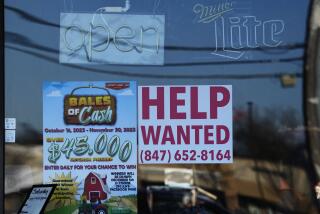Huge Layoffs May Now Be in Decline, but Worries Linger
- Share via
Rather than ringing in a new round of giant layoffs, AT&T; Corp.’s announcement Tuesday that it will cut 40,000 jobs may be sounding a toll for a passing era of massive jobs cutbacks.
But even though downsizing appears to be taking a new form at America’s biggest companies, labor market experts say the outlook isn’t getting any brighter for workers concerned about job security.
The big layoffs of 15,000 workers or more have been replaced over the last year by a barrage of smaller, more sharply focused cutbacks intended to “prune” business operations. Meanwhile, employment specialists say, worries keep rising among workers--fostering a jittery consumer mood that is likely to ripple through the economy.
“When people see these high-visibility layoffs, they ask themselves, ‘Is my company next, and will I be involved?’ ” said Donald H. Straszheim, chief economist of Merrill Lynch & Co.
AT&T;’s layoff announcement was the biggest since July 1993, when IBM said it would slash 63,000 jobs, according to Challenger, Gray & Christmas, a Chicago-based consulting firm that tracks corporate layoffs.
This week, the firm will release a report expected to show that layoffs among major companies declined overall in 1995 for the second year in a row, although there was a pickup in the last three months. The total for announced layoffs in 1995 will exceed 400,000, a relatively high level, although it is down from a peak of 615,186 in 1993.
The scale of the layoffs is declining because “most of the easy cutting has been done,” said Richard Belous, chief economist of National Planning Associates, a Washington think tank supported by business and labor. “A lot of corporations have reached the limit of what they can cut, and if they cut more it starts to get counterproductive.”
Belous and other economists acknowledge that some big cutbacks will continue at failing companies and in industries facing tough international competition or deregulation or undergoing other dramatic change. They point to such fields as telecommunications, computers, entertainment and financial services. But as a general rule, Belous said, AT&T;’s announcement “may prove to be the exception rather than the norm” in 1996.
The economy continues to produce new jobs to replace the ones eliminated by layoffs at Fortune 500 companies and other big employers. For example, Merrill Lynch’s Straszheim expects the nation’s economic growth to slow in 1996 but to still create enough new jobs to keep the unemployment level at close to its current rate of 5.6%.
*
Still, many economists argue that the quality of the new jobs--particularly what they offer in pay and benefits--doesn’t match that of the positions lost when big companies pare their work forces.
In addition, a pattern of laid-off workers increasingly shuffling from one job to another could affect everything from consumer spending to voting patterns.
Indeed, some economists worry that the same cuts that are boosting profits and raising share prices are undermining the economy.
Straszheim attributed the weak 1995 holiday shopping season--considered by many analysts to be the worst in years--to workers’ job insecurities. He also said the rising investments in mutual funds in recent years may result from workers who increasingly figure they will have to rely on their own saving and investing--rather than corporate pensions--to provide financial security in retirement.
Labor economist Audrey Freedman argues that regardless of whether the number of big layoffs is waning, cutbacks create doubts even in the minds of workers whose jobs are saved. “Every employee of AT&T; is scared, not just the ones who are getting laid off,” she said.
Throughout the labor market, Freedman said, “the experience for individual workers is constant flux, fear and having to go through layoffs and find other jobs.”
Moreover, Freedman worries about the impact of pervasive job insecurity on society at large. “Insecurity,” she said, “breeds less cooperation and less tolerance” both in the workplace and in the community.
Meanwhile, the drumbeat of layoffs continues. The layoffs of the past two months, experts say, demonstrate how the taboo on firing during the holiday season has faded.
In addition, they say, companies are increasingly laying off even when the bottom line is improving. “The technologies and the players are changing so fast that I don’t think anybody can afford to stand still,” said Richard J. Pinola, chairman of Right Management Consultants, a Philadelphia-based firm that deals with employment issues.
More to Read
Inside the business of entertainment
The Wide Shot brings you news, analysis and insights on everything from streaming wars to production — and what it all means for the future.
You may occasionally receive promotional content from the Los Angeles Times.










